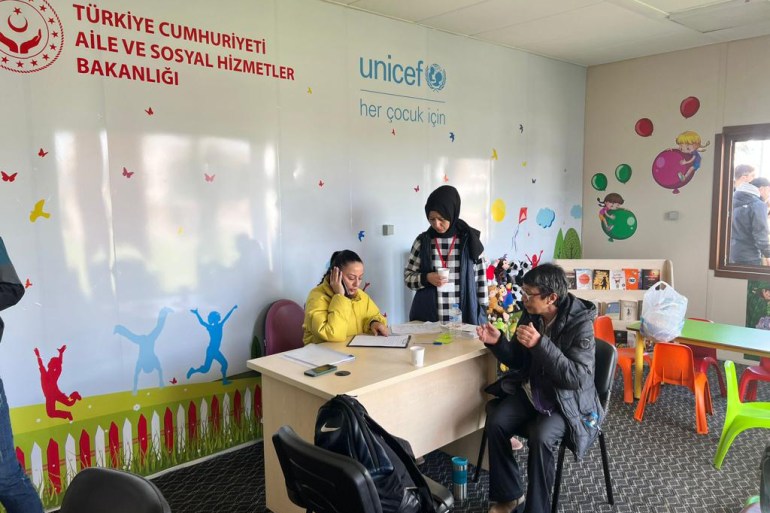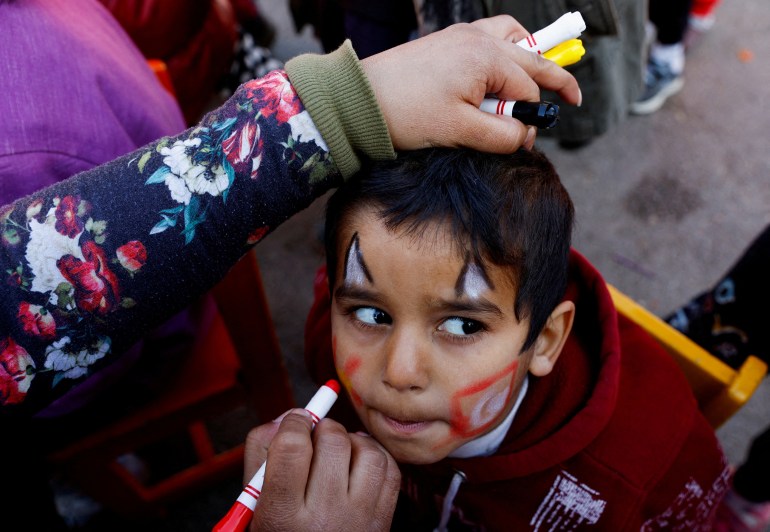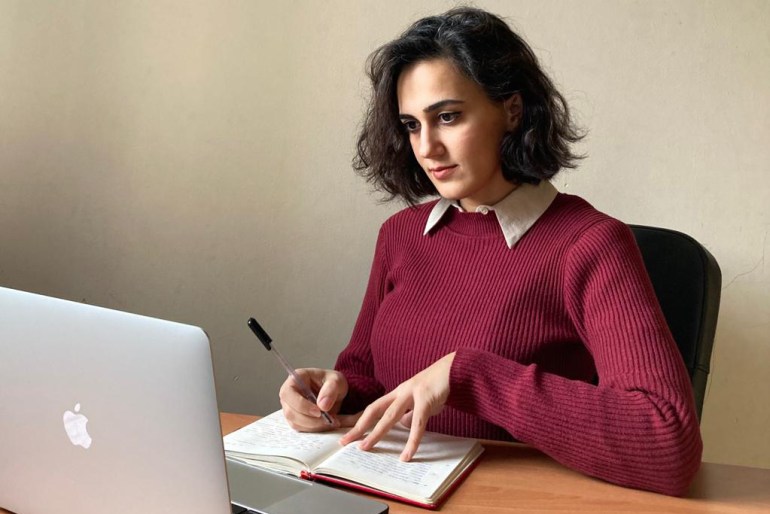Gaziantep, Turkey – When Elmas Abdulghani has a flashback, her physique nonetheless shakes like the ground of her condominium on that early February morning a 12 months in the past.
She was woken up by the screams of her husband, crying: “Elmas, wake up! Save your life!”
“I just remember fear and confusion,” 35-year-old Abdulghani says, virtually tearing up as her thoughts travels again in time.
Abdulghani’s husband didn’t survive the primary magnitude 7.8 earthquake, adopted by a second magnitude 7.6 one later within the day and tons of of aftershocks, that killed greater than 50,000 individuals in southeastern Turkey and northern Syria on February 6 final 12 months.
However Abdulghani did and, since that day, she has needed to cope with the restlessness of thoughts that got here from shedding the love of her life and her house in Gaziantep, an necessary metropolis within the southeast a number of kilometres from the epicentre.
Primitive defence mechanisms
The earthquakes created unimaginable psychological stressors for survivors like Abdulghani, from accidents and lasting worry of aftershocks to experiencing the destruction, displacement and deaths round them.
A couple of weeks after the bodily emergency wants had been met, teams of volunteer therapists and psychological well being NGO staff had been deployed throughout the area to assist victims and assist them course of their trauma.

“I’ve worked on other earthquakes and natural disasters in our country, such as the 1999 earthquake in Izmir, but this was different from any other,” says Hayal Demirci, a psychotherapist from the EMDR Trauma Restoration Group, which has deployed groups of psychological well being staff in tented settlements, container cities, motels and non permanent dormitories since early March final 12 months.
Within the first few weeks of their deployment, Demirci and greater than 1,000 volunteer therapists labored to offer a bodily protected atmosphere to scale back individuals’s acute reactions and, after some time, to ascertain a protected therapeutic bond and work with these reactions.
Demirci explains that when the traditional bonds between individuals disappear, the thoughts triggers probably the most primitive defence mechanisms to face a harsh actuality.
“There have been approach too many losses of relations, mates, limbs, houses, cities and hope for the long run.
“When these defence mechanisms are active, the sympathetic nervous system is on duty and … the person [feels] like they are in danger all the time. It’s not possible for people who don’t feel safe anywhere, at any time, to eat, sleep or meet their basic needs properly,” she says.
Most individuals, even after the aftershocks ultimately disappeared, felt stressed for months.
“Even though my family house was declared safe one week after the earthquake, I still didn’t feel safe staying inside,” says Mert Ozyurtkan, a 22-year-old engineering pupil at Gaziantep College.
“I would constantly stare at water bottles to see if the water was moving or at ceiling lamps to check if they were swinging slightly. It increased my anxiety levels, and affected my grades.”
Whereas most psychological well being assist in crises focuses on a short-term, emergency method, Demirci underlines the significance of constant to work with victims on-line to handle triggers and management flashbacks to scale back any signs.
For some, the earthquake modified whole life. Neslihan Hicdonmez and her husband Ali Ozaslan began residing in a camper van and stored their tenting sleeping luggage at hand as a result of they not felt protected in their very own house.
“The earthquake totally impacted our way of living. We had never thought of abandoning our newly bought house, but we constantly live with the fear that something of that magnitude may happen again.”
The impact on youngsters
If adults discover the results catastrophic, for kids of their early improvement the catastrophe left an indelible mark.
Sare Bitir, a fourth-grader at Ilkokulu Elementary College in Gaziantep, nonetheless brings her doll to high school for consolation.

“It’s the first object I brought with me when we ran out of the house,” she says. “It kept me company for three days while we were sleeping in our car because our house didn’t make us feel safe. It gives me confidence.”
Kids are among the many most uncovered group, says scientific psychologist Zeynep Bahadir, who has experience in post-traumatic stress dysfunction (PTSD) and volunteered for six weeks with the Turkish Pink Crescent as an emergency on-line psychologist for households with younger youngsters.
She provides that whether or not youngsters have been immediately affected or skilled secondary trauma, “they can be at the risk of post-traumatic stress disorder symptoms, including nightmares and avoidance behaviour”.
Separation nervousness particularly has proven up at school settings. When she returned to high school in September, Sare didn’t need to enter the category, too afraid to say goodbye to her dad and mom.
It took a really affected person instructor and pleasant classmates to carry her inside, though, for the primary few weeks, she couldn’t focus. Some youngsters prevented college for a number of weeks in a row.
In accordance with Bahadir, worry can persist in youngsters lengthy after the earthquake has handed, which “sometimes can be temporary, but can also adapt into their lives forever”.

Reliving the trauma of demise and loss
The state of affairs has been worse for Syrian refugees in Turkey who fled there throughout Syria’s conflict, says Yara al-Atrash, a psychological well being employee at INARA NGO.
Al-Atrash has been answerable for psychological help to Syrians residing in container camps and assisted many who’ve misplaced houses and kids, similar to they did through the conflict again house.
“Having to live again the trauma of death, loss and displacement, as well as realising that the new place that gave them safety was no longer safe, was a last blow to those who had survived the Syrian conflict,” she says.
Abdulghani, who lived by an offensive in her hometown of Homs, Syria, says the earthquakes reawakened traumas she thought she had healed.
She had not sought remedy, even after the conflict, however her restlessness because the one-year mark because the earthquake neared lastly made her search assist about two months in the past.
Now Abdulghani has been residing in Istanbul since February 2023, incapable of returning to Gaziantep and reliving her trauma. In remedy, she hopes to handle this worry to have the ability to lastly return.

“Therapy culture is not yet something known in our region, especially in the earthquake zone and villages, which were however the most impacted,” Demirci says.
Many mentioned they weren’t prepared for remedy, however emergency staff tried to encourage them to talk about their wounds. “Those who do not receive support in the acute period may, in the long term, suffer from addictions, including alcohol and drugs, anger and impulse control problems, or even somatic issues such as fibromyalgia, or migraine,” Demirci provides.
“The consequences could be as devastating as the earthquake itself in the future.”
Demirci’s work with survivors will proceed for a minimum of three extra years, the minimal time required to ensure their therapeutic path will probably be efficient.
As aftershocks within the area proceed, individuals say that dealing with them as a part of every day life is their new regular.
Songul Dogan, who moved to Gaziantep after her house was destroyed within the earthquake final 12 months, was paying a go to to her native Malatya this previous January 6 when a magnitude 4.5 earthquake hit the city.
“We can no longer trust the ground we walk on,” she says bitterly. “How can we keep going and still feel safe without losing our minds?”

